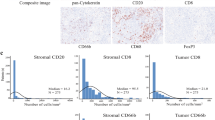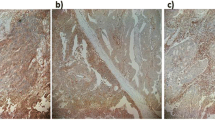Abstract
The purpose of this study was to clarify whether HLA-DR expression of colorectal tumour cells or the CD4+/CD8+ ratio of the tumour infiltrating lymphocytes is significantly associated with the prognosis of colorectal cancer. Using flow cytometry, we studied the tumour cell expression of the HLA class II in 70 enzymatically dissociated colorectal cancers and the phenotype of tumour infiltrating lymphocytes (TILs) in 41 cases. There was no trend in 5-year survival between three levels (low, medium, high) of HLA-DR expression on the tumour cells. Patients with low CD4+/CD8+ ratios had a better clinical course, with significantly higher 5-year survival, p=0.046, independent of the Dukes stage and age. Our results have implications for tumour immunology; colorectal cancer cells might be a target for cytotoxic T-lymphocytes, however the tumour cells are not able to initiate an immune response. Stimulation of the immune system could possible be obtained using dendritic cells cultured in vitro and loaded with tumour antigens.


Similar content being viewed by others
References
Andersen SN, Rognum TO, Lund E, Meling GI, Hauge S (1993) Strong HLA-DR expression in large bowel carcinomas is associated with good prognosis. Br J Cancer 68:80
Banner BF, Savas L, Baker S, Woda BA (1993) Characterization of the inflammatory cell populations in normal colon and colonic carcinomas. Virchows Arch B Cell Pathol Incl Mol Pathol 64:213
Bodmer WF, Browning MJ, Krausa P, Rowan A, Bicknell DC, Bodmer JG (1993) Tumor escape from immune response by variation in HLA expression and other mechanisms. Ann N Y Acad Sci 690:42
Csiba A, Whitwell HL, Moore M (1984) Distribution of histocompatibility and leucocyte differentiation antigens in normal human colon and in benign and malignant colonic neoplasms. Br J Cancer 50:699
Di Giorgio A, Botti C, Tocchi A, Mingazzini P, Flammia M (1992) The influence of tumor lymphocytic infiltration on long term survival of surgically treated colorectal cancer patients. Int Surg 77:256
Diederichsen ACP, Hansen TP, Nielsen O, Fenger C, Jensenius JC, Christensen PB, Kristensen T, Zeuthen J (1998) A comparison of flow cytometry and immunohistochemistry in human colorectal cancers. APMIS 106:562
Diederichsen ACP, Stenholm ACO, Kronborg O, Fenger C, Jensenius JC, Zeuthen J, Christensen PB, Kristensen T (1998) Flow cytometric investigation of immune-response-related surface molecules on human colorectal cancers. Int J Cancer (Pred Oncol) 79:283
Diederichsen ACP, Zeuthen J, Christensen PB, Kristensen T (1999) Characterisation of tumour infiltrating lymphocytes and correlations with immunological surface molecules in colorectal cancer. Eur J Cancer 35:721
Dukes CE, Bussey HJR (1958) The spread of rectal cancer and its effect on prognosis. Br J Cancer 12:309
Garrido F, Cabrera T, Lopez Nevot MA, Ruiz Cabello F (1995) HLA class I antigens in human tumors. Adv Cancer Res 67:155
Guidoboni M, Gafa R, Viel A et al. (2001) Microsatellite instability and high content of activated cytotoxic lymphocytes identify colon cancer patients with a favorable prognosis. Am J Pathol 159:297
Hÿkansson L, Adell G, Boeryd B, Sjÿgren F, Sjÿdahl R (1997) Infiltration of mononuclear inflammatory cells into primary colorectal carcinomas: an immunohistological analysis. Br J Cancer 75:374
Jass JR, Love SB, Northover JM (1987) A new prognostic classification of rectal cancer. Lancet 1:1303
Kaklamanis L, Gatter KC, Hill AB, Mortensen N, Harris AL, Krausa P, McMichael A, Bodmer JG, Bodmer WF (1992) Loss of HLA class-I alleles, heavy chains and beta 2-microglobulin in colorectal cancer. Int J Cancer 51:379
Lazaris AC, Theodoropoulos GE, Davaris PS, Panoussopoulos D, Nakopoulou L, Kittas C, Golematis BC (1995) Heat shock protein 70 and HLA-DR molecules tissue expression. Prognostic implications in colorectal cancer. Dis Colon Rectum 38:739
Lengauer C, Kinzler WK, Vogelstein B (1997) Genetic instability in colorectal cancers. Nature 386:623
Matsuda M, Petersson M, Lenkei R, Taupin JL, Magnusson I, Mellstedt H, Anderson P, Kiessling R (1995) Alterations in the signal-transducing molecules of T cells and NK cells in colorectal tumor-infiltrating, gut mucosal and peripheral lymphocytes: correlation with the stage of the disease. Int J Cancer 61:765
Matsuda S, Yamane T, Hamaji M (1998) CD4 and TCR alphabeta-positive T lymphocytes predominantly infiltrated into well-moderately differentiated colon adenocarcinoma tissues. Jpn J Clin Oncol 28:97
Möller P, Momburg F, Koretz K, Moldenhauer G, Herfarth C, Otto HF, Hammerling GJ, Schlag P (1991) Influence of major histocompatibility complex class I and II antigens on survival in colorectal carcinoma. Cancer Res 51:729
Moore M, Ghosh AK, Jones DJ (1989) MHC status of primary human colorectal carcinoma: biological significance and implications for host immune recognition. Acta Chir Scand Suppl 549:17
Naito Y, Saito K, Shiiba K, Ohuchi A, Saigenji K, Nagura H, Ohtani H (1998) CD8+ T cells infiltrated within cancer cell nests as a prognostic factor in human colorectal cancer. Cancer Res 58:3491
Østenstad B, Lea T, Schlichting E, Harboe M (1994) Human colorectal tumour infiltrating lymphocytes express activation markers and the CD45RO molecule, showing a primed population of lymphocytes in the tumour area. Gut 35:382
Schwartz RH (1990) A cell culture model for T lymphocyte clonal anergy. Science 248:1349
Turnbull RB Jr, Kyle K, Watson FR, Spratt J (1967) Cancer of the colon: the influence of the no-touch isolation technic on survival rates. Ann Surg 166:420
Acknowledgements
The authors thank Mrs. K. Kejling for excellent technical assistance. We also thank the Department of Clinical Immunology, Odense University Hospital, for use of laboratory facilities. This work was supported by the Danish Cancer Society, The P Carl Petersen Foundation, University of Southern Denmark, the Danish Medical Association Research Fund, Lunds Foundation, The Novo Nordisk Foundation and Skovgaards Foundation, Denmark.
Author information
Authors and Affiliations
Corresponding author
Rights and permissions
About this article
Cite this article
Diederichsen, A.C.P., v. B. Hjelmborg, J., Christensen, P.B. et al. Prognostic value of the CD4+/CD8+ ratio of tumour infiltrating lymphocytes in colorectal cancer and HLA-DR expression on tumour cells. Cancer Immunol Immunother 52, 423–428 (2003). https://doi.org/10.1007/s00262-003-0388-5
Received:
Accepted:
Published:
Issue Date:
DOI: https://doi.org/10.1007/s00262-003-0388-5




